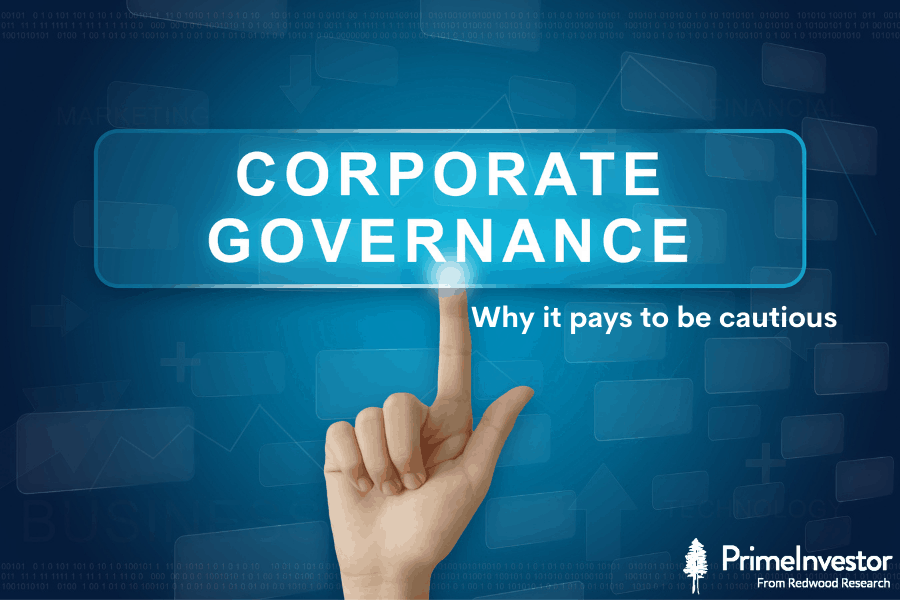
Many investors think of corporate governance as an esoteric concept that is good to have. But if is a little dodgy, they think it can be safely ignored, as it doesn’t affect them directly. They couldn’t be more mistaken.
Having discussed the origins of the concept of corporate governance, here are some key ways in which mis-governance at companies you own shares in can directly impact your returns.

First among equals
First, there are devices through which the average shareholder gets diluted. Surprisingly, it is the regulator who has made it legal. I am referring to the “Private Placements” that happen to promoters and other ‘institutional’ investors. Governance demands that any new offering of shares be offered equally to all the existing shareholders, so that their financial interest in the company is not diluted. The best way for a company is to announce a ‘rights’ issue at whatever price and then if the shareholders do not take up the entire offer, take it to others. Excluding the shareholders right at the outset is bad governance. The promoter has no right to presume that the other shareholders do not care about being diluted without their permission.
If a promoter wants to consolidate or increase his holdings, the ideal thing would be go and buy from the secondary market and not resort to these private placements.
Promoters can also issue ‘warrants’ to themselves, pay a small portion upfront and enjoy credit for a long time to pay up the balance. As a non-promoter shareholder, it is unfair. If a promoter wants to consolidate or increase his holdings, the ideal thing would be go and buy from the secondary market and not resort to these private placements. This is a regulatory failure also.
We know of DVR instruments that offer a lesser vote or no vote to the owner. In the early eighties, a company named Jagatjit Industries used this to wonderful impact. A preferential offer was made by one faction of promoter to itself, with each DVR carrying five votes!! There is more than one way to skin a cat. To me, a DVR with no voting rights is just perpetual debt.
Window dressing
Then there’s window dressing the books. Satyam was one of the big instances of fraudulent accounting in order to hide fictitious revenues and clients. Firstly, it presented a healthy picture of the company when it was already in trouble, thereby helping some (favoured) shareholders to exit and luring some to buy at higher prices than warranted. I am sure that the time between the discovery of the fraud and the rescue by the Mahindras was painful for most Satyam stakeholders and gainful for those who ventured. I do not know what the solution is, but maybe once the fraud was discovered, should the shareholding have been frozen, trades halted till there was a resolution?
Whenever a company has multiple subsidiaries, it is useful to be suspicious especially when the subsidiary is a result of some overseas or domestic acquisition or when the promoter family is a part owner of the subsidiary
IL&FS was a recent discovery. However, in the analysts’ corridor, there was always a whiff of fabrication about the books. It is surprising that seasoned professionals invested other peoples’ money in debt issued by that group. The rating agencies were incompetent, but that like saying that I trusted a movie critic and went to a film which turned out to be a dud.
Whenever a company has multiple subsidiaries, it is useful to be suspicious especially when the subsidiary is a result of some overseas or domestic acquisition or when the promoter family is a part owner of the subsidiary. Acquisitions overseas with unknown names are a great way for someone to siphon money. Usually, the acquired company belongs to someone known or related. A promoter goes and acquires the holding company of an overseas business at an inflated price. Keep an eye out for companies that have too strong a penchant for the inorganic route.
Corporate actions
Capital misallocation is another big governance issue. I invest in ITC because I think cigarettes is a very profitable business. I am happy to live with the risk of government shutting down the business (which it never will, given the taxes it gives). As a shareholder, I have pegged my ROE on this investment based on the cigarette business. If the company wants to enter into another business, it should take PRIOR approval. By engaging in diversification and corporate actions solely at the whims of the management, the company makes sub optimal usevof capital. I want the cash that is earned by the cigarette business as a dividend. I will decide what to do. It is not up to them to set up hotels, paper companies, edible oil manufacture, FMCG business etc. If I want to share in the FMCG business I can buy the shares of HUL or P&G.
A company like ITC can probably ‘afford’ what it is doing. It simply means lower returns for the shareholders as opposed to a pure tobacco company. In many other cases, a company’s very survival can be threatened by questionable capital allocation..
There are many companies that undertake corporate actions purely to please the promoter. I recall Raymond going into steel or companies being neatly divided up to amicably ‘settle’ a family dispute.
Related party deals
In the days when there used to be “REP” licenses (a license given to an exporter as an incentive, with which he could import anything at a concessional duty), one textile company used to export everything through a family owned company. The shareholders of the company got nothing. And the promoter had the gall to mention in the annual report that the company products are exported to so many countries! My eyes went to the foreign exchange earnings, where I saw nothing. This lead me to enquire and the story came out.
A textile company was using its surplus real estate (because the mills had shut down) to make residential complexes. The shareholders did not get much of the gains. The apartments were sold to family and friends at deep discount and all sales to the public were effected by them. I am always skeptical about valuing real estate in a company. The gains can be very elusive if you’re a minority shareholder.
There is an issue of governance when there is a “brand” royalty paid.
Does Tata Sons taking royalties from all group companies sound fair ? Have a look here at a summary https://economictimes.indiatimes.com/news/company/corporate-trends/97-billion-tata-group-redrawing-brand-equity-agreement-to-reflect-the-universal-nature-of-business/articleshow/30300169.cms?from=mdr
In some cases, brands are owned by family companies and not by the listed entity. The brand is built by the listed entity, but the non-promoter shareholder does not get the benefit of the brand. It would be useful if there is a mandatory declaration in the annual report about the brands and the ownership thereof.
When Hero Motors parted company with Honda (https://www.financialexpress.com/archive/fe-editorial-no-longer-a-hero/760186/ ) and (https://timesofindia.indiatimes.com/business/india-business/hero-honda-split-terms-finalized/articleshow/7109297.cms ) there was talk of non promoter shareholders getting a lesser deal than the promoters. However, analysts did not go in to it, because the business per se was so attractive that this was brushed away.
Promoter stakes
Sometimes, promoters decide to exit and there is no warning to the shareholders. It is a post facto decision. Recently, Harita Seatings Ltd (a TVS company) saw promoter stakes change hands. One would expect that if there is going to be a sale or an exit, it should be with PRIOR knowledge and approval from ALL shareholders. How does one know whether the business was sold out at the best price? In this case, it was perhaps the promoter shares that were sold, but it set a benchmark on the value of the company. Both sides cannot win in such a deal.
PSU problems
A company like GAIL, which would have commanded tremendous value if it was a pure gas transportation company, was made to share the subsidy and then made to promote a refinery with another PSU.
As a class, the PSU shareholders often get the short end of the stick. A company like GAIL, which would have commanded tremendous value if it was a pure gas transportation company, was made to share the subsidy and then made to promote a refinery with another PSU. We never know what this promoter is up to. PSU Banks become a tool for loan melas. There are some pure plays like CONCOR, but one never knows. Tomorrow, the Railways might just like to up the rent on the land where CONCOR runs its business.
Detecting misgovernance
Here is an interesting case available from public records. The company has paid cumulative dividend of Rs.418 Crores in past 8 years. During the same period it raised Rs.595.69 Crores by way of equity issues and Rs.1,122 Crores by way of debt mainly to fund 10 acquisitions over 11 years. There are at least ten other points that give raise to doubts about the veracity of the books.
Many years ago, I had noticed in the annual report of a company named “Bartronics Ltd” that the debtors under six months exceeded the sales for the last two quarters of the year. There are many like this. The problem is that analysis today is not easy. Disclosure standards are weaker today.
Apart from this, there are the more universal governance issues- appointment of key persons, business with family, appointment of auditors, directors etc.
To identify cases of mis-governance, I try and focus on the consistency in ROE. I assume that the standards of governance are what they are. What to look out for is some new acts that can cause the ROE to fall or any suspicion around the accounting narrative. As an individual investor, I do not have to prove anything to anyone. One thing I can do is to keep away. Or if I buy, I go in with the knowledge that I could lose the entire bet. If I am going to put a large chunk into a company for the long term, I definitely make detailed enquiries about the promoter and the management.
As investors, it pays to be always suspicious and assume that the promoter has all the trump cards. Therefore keeping eyes and ears open is the key. Eliminate all room for disappointments on the governance front and that will help you focus on a stock’s price and true underlying value.
Our previous article on corporate governance can be found here.





2 thoughts on “The many roads to mis-governance”
Hi
I have 2 questions:
(1) Are C-score and Z-score of any REAL help as a part of evaluating or comparing stocks?
(2) Is there any substance in the belief that in terms of selecting companies, there is a better chance of avoiding Corporate Government issues if one selects a company which has professionals running a company rather than an owner-promoter running the company – let’s say companies like HDFC group companies, L&T, TCS etc versus a Yes Bank, Reliance, Kingfisher etc.
Thanks
C -Score and Z- Score can be useful, but not to be an only tool.
Professional or not makes not much difference. ITC/L&T are run by professionals.
No guarantee of that. In the US, we saw professionals manage companies like Enron
Comments are closed.